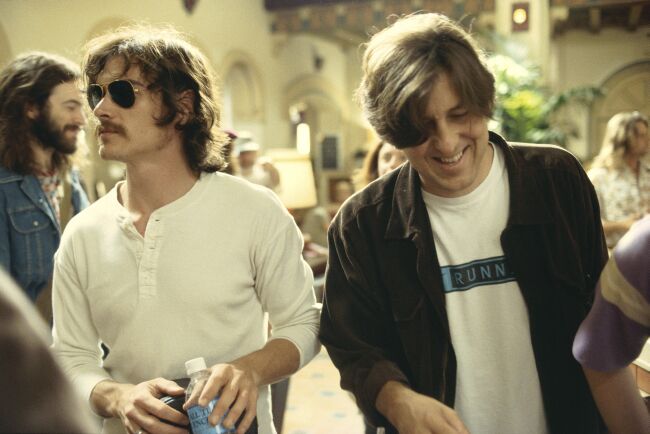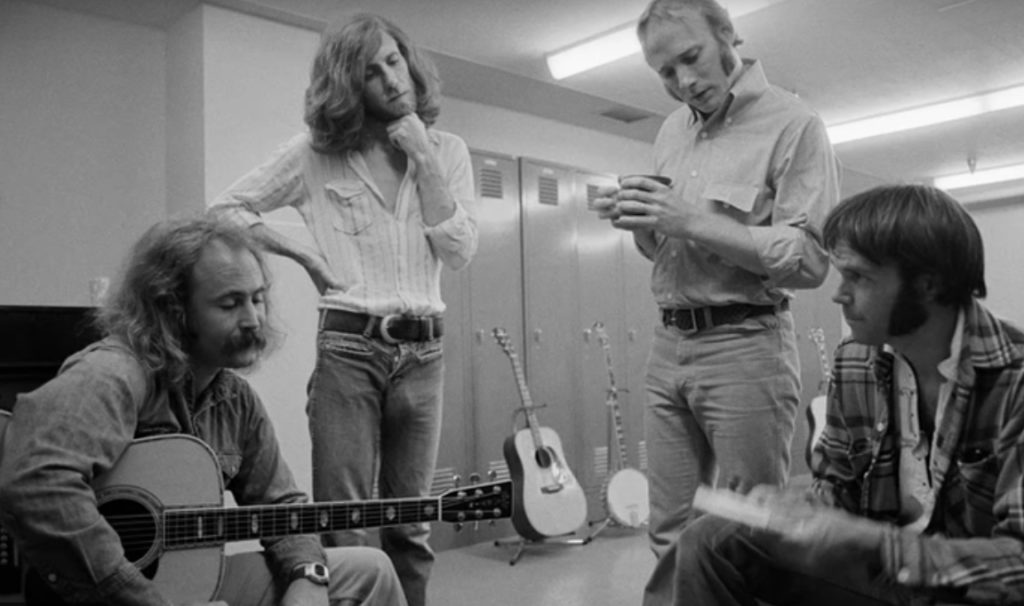As rock & roll biopics and retro-minded music documentaries enjoy a moment in the spotlight again, looking back at Almost Famous makes for an enlightening and heartening take on the pivotal ‘70s rock music scene. Cameron Crowe’s storytelling was less about a “a mid-level band struggling with their own limitations in the harsh face of stardom,” and more about the wonder and power of music, and how it can and does set the path for one’s life sometimes. It’s a love story really, and even when it gets a little cliche, its truth resonates for journalists, for musicians and for fans.
Crowe comes full circle revisiting these ideas and returning to a more journalistic mode as producer and interviewer in the new documentary, David Crosby: Remember My Name, a candid, complex and in some ways wistful portrait of the rock legend known for his work in Crosby, Stills, Nash & Young and The Byrds. When I talk to Crosby by phone before the film’s premiere, he states that he and his band were in fact one of the main inspirations for the group Stillwater in Almost Famous, as Crowe interviewed him for Rolling Stone when the writer/director was just a teenager. The two developed a friendship and have stayed in touch over the years.
Directed by A.J. Eaton, the new film, which opened in theaters this past weekend, will enjoy a full run theatrically before hitting streaming services. Crosby is also embarking on a tour (he’ll be at L.A.’s Saban Theater in September), playing old and new music — much of the latter made with his son. He enthuses, “I still really love to sing,” though he admits his health and age make things grueling. (“Don’t love to tour,” he adds.) In the doc he’s even more pragmatic, explaining that touring is necessary because he has to “pay the mortgage.”
Crosby is not one to sugarcoat anything, even if it might make him come off better. At 77 years old, he reflects on his past and talks about his present in a way that’s endearingly B.S.-free. He showed a little bit of this curmudgeonly candor in another doc that covers some of the same period, Jakob Dylan’s Echo in the Canyon. But with Remember My Name, the music legend is front and center.

Billy Crudup and Cameron Crowe on the set of Almost Famous. (Courtesy Dreamworks)
Even Crowe himself takes a notable backseat, never actually appearing on screen as he asks his old subject and friend probing questions about everything from his love life (including his relationship with Joni Mitchell), his medical conditions (he had a liver transplant in 1994 and three heart attacks), his addictions, and probably most intriguing, his conflicts with various band members over the years.
“He’s a natural storyteller,” Crowe says of Crosby as we discuss the film and rock journo life in his Westwood high-rise office overlooking the city. “Like, if you do this kind of stuff and you love interviewing people, you just love the person that comes in and is just like the brightest light in the room and answers all your questions.”
Crowe says he wanted to be involved in the project as soon as he heard about it. He was working on the Showtime program Roadies (which only ran for one season, but he hopes will be available for more people to view via streaming services soon) so he offered to just be the interviewer for Eaton. He later came on as a producer too and worked with the director on the biographical scope of the film. “My thing was like if you’ve got David Crosby, you’ve got to take the whole bite,” he says passionately. “Let’s just serve the full meal.”
As a fan of Crosby, Crowe felt the “talking heads” format seen in most rock docs should mostly be avoided. Crosby is a character and nobody could possibly provide the kind of perspective he does here. And since part of his story includes current struggles with health and his enduring desire to create new music, the flashback portions of Remember My Name are deftly balanced with contemporary moments, including his home life with his current wife, and the creative process as it is right now. (Curiously — or perhaps not? — Crosby’s much reported DNA donation to help Melissa Etheridge and her partner have children was left out).
When it comes to rock & roll-themed film and television, the perspective provided by the players involved, looking back at their choices, actions and mistakes, are always compelling — especially if there’s some kind of redemption involved at the end. VH1’s Behind The Music turned the typical musical trajectory into a formula that we all recognize now, and it seems every documentary that’s followed has struggled to break away from it.

Screenshot of CSNY from David Crosby: Remember My Name (Sony Pictures)
On the other hand, many docs (and biopics) these days — especially those for TV — tend to gloss over things or worse, glorify bad behavior with a “boys will be boys” slant that’s at best disingenuous. Crowe and Eaton’s film does neither, relying on their subject to carry the emotional, as well as musical, weight.
Crosby says he trusted the filmmakers implicitly. “It’s not really my movie,” he says.” It’s theirs. But I know I didn’t want a shine job. And this isn’t.”
Indeed, we see Crosby’s range of emotions throughout the film — he’s cranky (when Crowe takes him to iconic spots in Laurel Canyon), melancholy (about his past loves) and generally contemplative as he looks back on his life, a life that he seems to expect could end pretty soon. Facing mortality in this way, on film, gives Remember My Name a raw feel. It also makes those of us who love a happy ending (and/or a momentous make-up session and reunion tour) long for a semblance of closure when it comes Crosby’s estranged bandmates (Graham Nash and Neil Young), whom he hasn’t spoken to in years and who don’t have the kindest things to say about him, even now. We don’t get it, and that makes this story all the more real.
Crosby seems at peace with himself in terms of owning his actions, and learning and growing from them over the years, and the documentary highlights his personality and point of view in a way that feels organic and conversational, thanks to Crowe and Eaton knowing their subject so well.
“Time is the greatest currency’,” Crowe quotes Crosby from the film, when asked about the takeaway for viewers. “I love that quote. The other thing he says that I just adore, is ‘love is the greatest thing we do’… even greater than the music that he made, he actually gives you an existential gift in the film where he says, ‘look, I’m about to die and all of the drugs and sex and great music and all that stuff — it’s not giving me more time. The only thing that’s giving me more time is luck. And here’s how I want to use the time I have left.”
Advertising disclosure: We may receive compensation for some of the links in our stories. Thank you for supporting LA Weekly and our advertisers.

